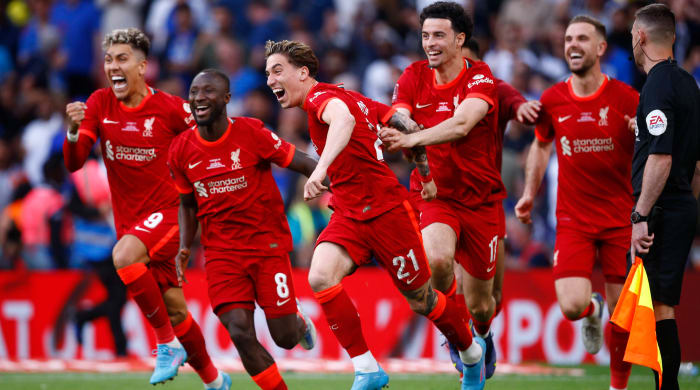Liverpool’s Historic Season Continues With Another Cagey Cup Final Win vs. Chelsea
The margins at times are impossibly fine. Liverpool and Chelsea have met four times this season and four times they have drawn. But in each of the two cup finals, Liverpool has prevailed in penalty shootouts.
The Reds have yet another a taste of glory and may enjoy more; Chelsea has nothing. This wasn’t quite the 22-kick marathon of the League Cup final in February, but it took 14 kicks here to separate the sides, Liverpool GK Alisson eventually saving from Chelsea’s Mason Mount before the unlikely figure of reserve left back Kostas Tsimikas won the FA Cup for Liverpool.
150 years since the first FA Cup final, this was a day of history: the first ever 0–0 draw in a FA Cup final at Wembley Stadium (although the fifth in total) and the first ever Wembley FA Cup final penalty shootout (although the third overall). It was also Liverpool manager Jürgen Klopp’s first FA Cup triumph; by picking up the two domestic Cups this season, he has begun to answer the quibble that, for all Liverpool’s evident brilliance, he has not actually won very much silverware there. That’s four major trophies now, with the possibility of two more to come this season.
And that, perhaps, is the real significance of Liverpool’s win. When Edouard Mendy saved from his Senegal teammate Sadio Mané to take the shootout into sudden death, there was a clear sense of jeopardy. No side has ever reached this stage of the season before with hopes of a quadruple (Champions League, Premier League, League Cup and FA Cup) still alive, but given Manchester City is a clear favorite for the Premier League, the possibility of Liverpool ending the season with just the less prestigious of England’s two domestic cup trophies seemed very real and that brings a pressure of its own.
There were consequences to the victory, though. Mohamed Salah was forced off in the first half with a groin injury, and Virgil van Dijk made way at the end of normal time. There must be doubts about the fitness of both for the remaining two games of the league season and also for the Champions League final against Real Madrid in a fortnight.
For Chelsea this was the end of an era. Roman Abramovich’s time as owner will not end with a trophy in its last season, and all there is left to play for is ensuring that it will qualify to play Champions League football next season under the consortium led by Todd Boehly. Form has disintegrated in the last few weeks and there are major doubts over the center forward position.
With Kai Havertz injured, Romelu Lukaku started but had little impact on the game, and Timo Werner was left on the bench with a hamstring injury picked up in warmups. That left midfielder Ruben Loftus-Cheek forced into brief and unconvincing emergency service as a central striker. He was then removed for the lesser-spotted Ross Barkley, a bizarre sequence of events that in part meant defenders had to take penalties in the shootout.
Yet Chelsea was not far away from winning this. The two sides produced four hours of goalless football at Wembley this season, most of it absorbing, but with a distinct sense of two managers who know each other extremely well canceling each other out (although there were 58 shots).
Those opening minutes were reminiscent of the semifinal in which Liverpool had blown Manchester City away by halftime. Again and again Luis Díaz found space, exploiting the apparently shaky understanding between the right wing back Reece James and Trevoh Chalobah, on the right of the back three, but once that avenue was closed down, it was probably Chelsea who looked the more likely to score. Attacking midfielder Mason Mount, as ever, seemed the likeliest to create the breakthrough, forward Christian Pulisic twice putting decent chances wide, while left wing back Marcos Alonso, as well as hitting the bar with a free kick from a tight angle, repeatedly found room behind Liverpool’s Trent Alexander-Arnold.
As the game went in, Liverpool looked the fitter. Díaz’s frustrating afternoon continued with more near misses, one effort clipping the outside of the right post. A minute later, Andy Robertson thudded a shot against the left post, but Chelsea held on for extra-time, by which point this all felt curiously old-fashioned. The fatigue and the anxiety was obvious, less because of the famously sapping Cumberland turf of Wembley than because both these sides have played an awful lot of football this season, Chelsea winning the Club World Cup and Liverpool reaching the Champions League final.
Liverpool briefly seemed in danger of having the sort of season that characterized Leeds under Don Revie: going deep in every competition, wearing themselves out, and winning very little. Two trophies are in the bag now this season, two more remain possible. Liverpool needs a favor from West Ham against Manchester City on Sunday but even if the league does elude the Reds, Paris at the end of the month could offer a glorious treble of cups.
More Soccer Coverage:





